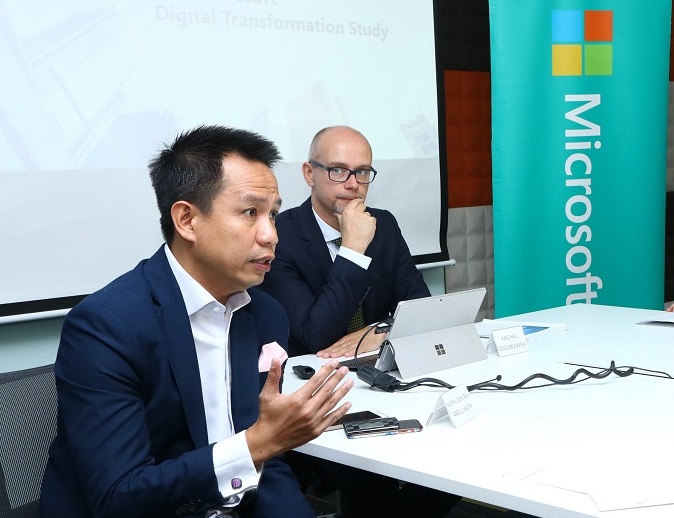Going digital requires more than incentives: MDEC
By Edwin Yapp July 4, 2017
- Transformation can’t be dependent only on incentives as it is dated thinking
- Top leadership needs to drive change; legacy systems, thinking main impediments

MALAYSIAN organisations embarking on their respective digital transformation projects should not merely depend on incentives provided by the government to do so but should focus instead on how they can drive change from within their organisations, according to the Malaysia Digital Economy Corporation (MDEC).
Speaking at a media briefing to announce the results of a digital transformation study commissioned by Microsoft Corp, Norhizam Abdul Kadir, its vice president for growth ecosystem development argued that organisations who are still practising an incentive-driven mentality is dated thinking, something that needs to be changed.
“It’s very much old versus new thinking. [People always] think that if you want change, there must be incentives to change,” he argued.
“Digital transformation is about the change in business [models] and mindsets, not about just about technology,” he stressed, adding that such efforts must be internally driven.
The Microsoft Digital Transformation Survey was conducted by an independent research agency based in Singapore. The study was conducted through a mix of telephone, face-to-face interviews and online surveys between September and November 2016.
The perception-based survey polled 1,494 C-level business leaders from 13 markets from companies with a headcount of 250 or more. Other than this criterion, Microsoft did not have any say on how the respondents were chosen. In Malaysia, 113 business leaders (respondents) from various verticals responded to the survey.
The study revealed that 80% of business leaders in Malaysia agreed that every organisation needs to transform into a digital business to enable future growth. However, only 34% of organisations have a full strategy in place, which is defined as “a company having matured and developed digital processes, people readiness and support systems in place to engage with customers.”
The survey also revealed that 47% have some kind of digitisation efforts underway, and that 19% have a limited or no strategy today.
More alarming was the revelation that 36% of respondents polled felt they lacked organisational leadership to ideate, plan, and execute digital transformation and that 28% felt that there was a lack of supporting government policies and information and communications technology (ICT).
Other barriers against the adoption of digital transformation in Malaysia included: Cyber threats and security concerns (27%); uncertain economic environment (26%); and the lack of digitally skilled workforce (22%), the study noted.
Asked what he thought about the perception that almost a third of respondents mentioned the lack of supporting policies and incentives to support their digital transformation initiatives, Norhizam acknowledged that MDEC has often had numerous conversations with small- and medium-sized enterprises (SMEs) about what policies they want changed.
Arguing that merely providing incentives won’t work, Norhizam said, “Digital transformation is about problem solving and a change of mindset that goes with it.
“An organisation may want digital transformation in the way it procures its products but if its processes to do this aren’t changed [digitised], it will struggle,” he stressed.
“And for a manufacturing company to digitise, it would need to ask whether embracing automation to replace manual labour is the way to go. But a lot of these challenges aren’t tackled [by our SMEs] and this is why I believe there is always talk about incentives.”
Norhizam claimed that in general, MDEC has put together good policies for digital transformation. These policies are either driven by MDEC or by other agencies in other ministries.
For example, another ministry that has been active in changing its policies to regulate ride-sharing companies such as Grab and Uber is SPAD (Land Public Transport Commission).
Norhizam also said that any organisation facing digital transformation must drive changes from within and from the top. “If the C-level [and all its staff downwards] aren’t going to change their mindset, they will not embrace innovation,” he stressed.
Concurring with this view was Michal Golebiewski, chief marketing and operations officer of Microsoft Malaysia, adding that the Redmond, Washington software giant has learnt that organisations that do not evolve fast enough will be less competitive or even become obsolete as they face disruptions in every industry.
“We urge organisations of all sizes to digitally transform themselves amidst changing demands externally and internally, to stay relevant,” he said in a statement accompanying the event.
Next page: Dragging their feet


